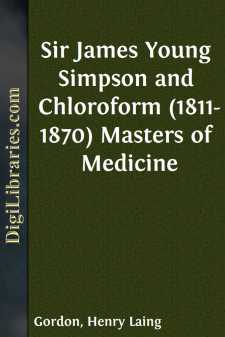Categories
- Antiques & Collectibles 13
- Architecture 36
- Art 48
- Bibles 22
- Biography & Autobiography 813
- Body, Mind & Spirit 142
- Business & Economics 28
- Children's Books 17
- Children's Fiction 14
- Computers 4
- Cooking 94
- Crafts & Hobbies 4
- Drama 346
- Education 46
- Family & Relationships 57
- Fiction 11829
- Games 19
- Gardening 17
- Health & Fitness 34
- History 1377
- House & Home 1
- Humor 147
- Juvenile Fiction 1873
- Juvenile Nonfiction 202
- Language Arts & Disciplines 88
- Law 16
- Literary Collections 686
- Literary Criticism 179
- Mathematics 13
- Medical 41
- Music 40
- Nature 179
- Non-Classifiable 1768
- Performing Arts 7
- Periodicals 1453
- Philosophy 64
- Photography 2
- Poetry 896
- Political Science 203
- Psychology 42
- Reference 154
- Religion 513
- Science 126
- Self-Help 84
- Social Science 81
- Sports & Recreation 34
- Study Aids 3
- Technology & Engineering 59
- Transportation 23
- Travel 463
- True Crime 29
Sir James Young Simpson and Chloroform (1811-1870) Masters of Medicine
Description:
Excerpt
James Young Simpson, who will ever be remembered as the discoverer of the pain-annulling power of chloroform, was born in the year 1811, at a period when there was room for a hero in the practice of the healing art in the British Islands.
It is true that in the seventeenth century Harvey had laid bare the great fact of the circulation of the blood and the practical Thomas Sydenham had swept aside the highly empirical systems and theories of medicine which had successively supplanted each other since Hippocrates first taught, and urged men to found their knowledge upon what they actually saw—on observation and experiment; and that in the eighteenth century men like Cheyne, Heberden, Cullen, and the wonderful Jenner had appreciably assisted in developing medicine at the same time that Hunter was raising surgery nearer to the level of a science. But even while Simpson was growing out of childhood all the powers of such professional giants as Bright, Addison, Abernethy, Astley Cooper, and Charles Bell, were insufficient to dispel the massive cloud of mystery and superstition which enveloped the practice of both medicine and surgery in this country and obscured whatever there was of truth in the teaching of these men.
In the first decade or two of this century the medical profession had not yet entirely abandoned the use of the golden-headed cane, nor had what Oliver Wendell Holmes calls the solemn farce of overdrugging yet ceased. “Humours,” “impostumes,” “iliac passions,” and such like were still spoken of—terms now heard only amongst country-folks in remote districts and that rarely, or encountered in curious old medical publications. Messes and abominations, prepared by the apothecaries according to more or less secret recipes handed down through the Middle Ages, were swallowed in good faith; blood-letting was still a panacea; and such remedies as that of holding a live puppy to the body for the relief of colic still had their professional advocates, but happily a decreasing number; whilst those pains
“... In the hour,
When the veil of the body we feel
Rent round us—while torments reveal
The motherhood’s advent in power”
—pains which Simpson was the first truly to relieve by his application of anæsthetics, were gravely said to be alleviated by the swallowing of a concoction of white onions and oil. Surgery was no doubt ahead of medicine; but the early surgical records of this century have little more than a curious interest to modern practitioners. Operations entirely unknown to our professional forefathers less than a century ago are now performed in safety daily. Such mysterious diseases as “icteric irritative fever” and “acute sinking” after operations, dreaded then with the fear that is always inspired by unseen or ill-understood dangers, have vanished before the progress of modern science in which the introduction of anæsthesia was the first great step.
The practice of the branch of medicine which Simpson made so peculiarly his own—that of obstetrics—originally in the hands of women only, had been fiercely contested for by the two sexes during two centuries, and such was the feeling against man-midwives in Scotland that the dispute had scarcely ceased at Simpson’s birth....


